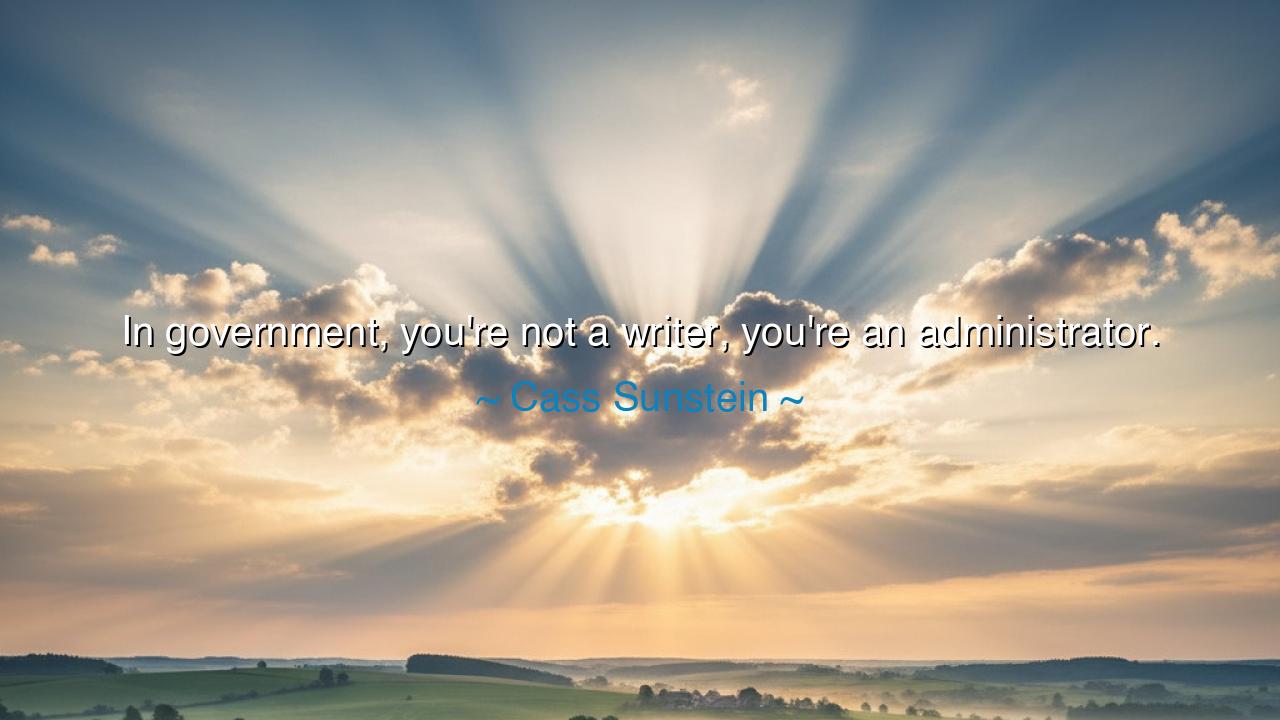
In government, you're not a writer, you're an administrator.






“In government, you’re not a writer, you’re an administrator.” So declared Cass Sunstein, a scholar of law and a craftsman of policy, whose words ring with both humility and revelation. In these few syllables, he captures the eternal truth of public service — that those who govern do not shape their world with dreams alone, but with duty. The poet may move hearts with words, and the philosopher may move minds with thought, but the servant of government must move the machinery of a nation with action, patience, and order. Sunstein reminds us that governing is not imagining — it is building, and building requires discipline more than inspiration.
This quote was born from Sunstein’s deep experience within the halls of power, where ideas, however brilliant, must bow before process. As an architect of regulation and advisor to presidents, he knew that the dream of reform often dies not for lack of vision, but for lack of structure. When he says, “you’re not a writer,” he speaks to all who enter government expecting to create masterpieces — swift, elegant, and unchallenged. But governance, unlike art, is not the work of one mind. It is a collective labor, a weaving of many hands and many wills. To govern well is to accept that one’s words must yield to the slow rhythm of compromise, law, and institution.
The writer, in his solitude, seeks perfection; the administrator, in his service, seeks continuity. The writer may tear down a page that displeases him, but the administrator cannot tear down a system without endangering lives. To govern is to understand consequence — that each decision ripples outward, touching unseen corners of society. It demands not only intellect but restraint; not only creativity, but constancy. Sunstein’s words remind us that those who enter public office must trade the pen of the dreamer for the ledger of the steward. For it is easy to imagine a better world; it is infinitely harder to manage the one that already exists.
We see this truth played out across history. Consider the tale of Thomas Jefferson, that brilliant writer of freedom’s charter — the Declaration of Independence. In his youth, he wrote with the thunder of ideals, declaring that “all men are created equal.” But when he ascended to the presidency, he learned that ideals are tested by the weight of reality. The dreamer who once wrote against tyranny had to now administer a divided nation, balance debts, navigate war, and uphold justice amidst imperfection. The fire of rhetoric gave way to the patience of governance. Jefferson’s life, like Sunstein’s insight, teaches us that the path from vision to action is not a leap, but a long and careful walk.
To be an administrator is, therefore, a noble calling — though less glamorous than that of the visionary. The administrator works in the quiet hours, where decisions are buried in files and formulas, unseen by the world yet shaping its course. They are the caretakers of continuity, ensuring that the machinery of government turns with fairness and purpose. Sunstein’s words, though humble in tone, speak to the grandeur of this unseen labor. For civilizations endure not by speeches alone, but by those who keep order in the aftermath of words. The administrator is the guardian of the public trust, the one who translates principle into policy, and policy into the daily bread of society.
Yet, this truth carries a deeper challenge — for in administration lies both virtue and peril. When the writer’s fire is forgotten, bureaucracy becomes cold and blind. The great danger of government is not chaos, but stagnation — when the servant forgets the soul of the people and clings only to rules. Thus, the ideal ruler must learn to hold both natures within himself: the vision of the writer and the discipline of the administrator. One without the other leads either to tyranny or decay. The writer alone dreams of perfection; the administrator alone preserves imperfection. True leadership, as Sunstein implies, is the harmony of both.
Let this be the lesson, then, for all who seek to serve: to govern is not to create for oneself, but to sustain for others. If you would lead, first learn to listen; if you would reform, first learn to respect what has been built. The writer lives by inspiration, but the administrator lives by responsibility — and responsibility is the truest test of wisdom. Do not scorn the humble work of policy, for it is through such quiet diligence that nations thrive.
So remember, O student of power: in the realm of government, your words alone are not enough. Write, yes — but then step beyond the page. Build systems that last, uphold laws that protect, and manage with the patience of one who serves eternity. For as Cass Sunstein teaches, the greatness of government lies not in its poetry, but in its perseverance.






AAdministratorAdministrator
Welcome, honored guests. Please leave a comment, we will respond soon